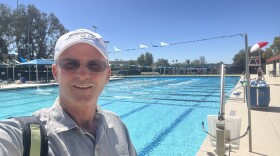It was January 2020 when COVID-19 was first reported in the United States. Six months later, Julia Moore Vogel started feeling the symptoms.
But they didn’t go away in a couple of weeks. Today, three and a half years later, she still gets the headaches and feels the fatigue.
“I used to be a long-distance runner and now I have to sit down to even take a shower,” said Moore Vogel, director of programs at Scripps Research. “There are very basic tasks that I can’t do.
But what she can do is lead an academic study that could be a big help to people like her.
Moore Vogel is the principal investigator for the Long COVID Wearable Study. Scripps’ goal is to recruit 500 participants who will wear a Garmin wristband that monitors their health every day.
“What is great about it is they have this body battery feature, which takes into account your sleep, your heart rate, your heart variability and your step count, and puts it all together in one metric,” Moore Vogel said.
The goal of the study is to find out if this health monitoring process can help people with long COVID to pace themselves.
The Centers for Disease Control estimates about 7% of American adults have long COVID. It is a disease with the common symptoms of COVID-19, but the symptoms linger, often for years.
There is no cure and no medical treatment for long COVID. But Moore Vogel said people can live a better life if they better understand how pacing works, and how much stress they’re putting on their system.
“You don’t feel the effects of overdoing it right away. You feel it 24 to 48 hours later,” she said.
She adds that people with long COVID have what can be called an energy bubble.
"The idea is, can we use this guidance to help people stay within their energy bubble? And therefore decrease the symptoms because they’re not going off that cliff, making things much worse,” she said.
Researchers will follow the study group for a year. Moore Vogel hopes the study shows that if people with long COVID properly pace themselves, they will be able to expand that energy bubble and live a better life. At this point Scripps Research is still recruiting people with long COVID to take part in the study.






